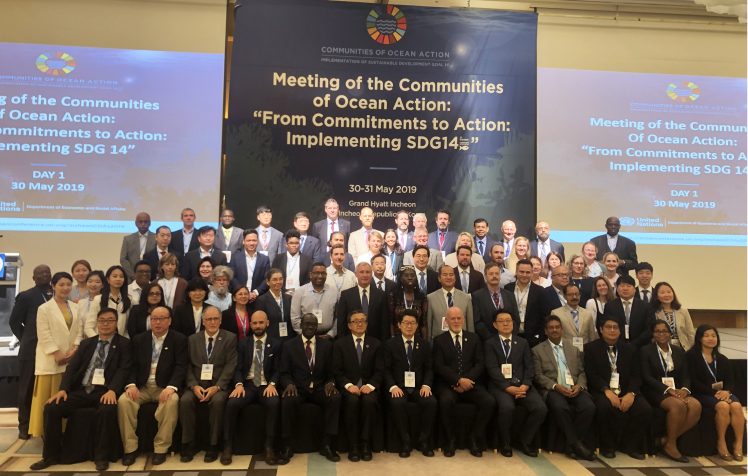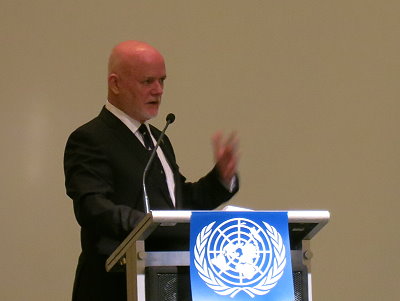 More partnerships and a boost of activities are needed to accelerate the implementation of Agenda 2030. That was the message of the meeting of the Communities of Ocean Action that took place in Incheon, Korea, on 30 and 31 May 2019. On invitation of the UN Department of Economic and Social Affairs (UN-DESA) Mundus maris participated together with other experts from civil society organisations (CSO), UN agencies, research organisations and governments taking stock of the more than 1500 commitments for SDG 14 made since the 2017 UN Ocean Conference. The entire focus was on exchanging experiences on how to accelerate and scale up action.
More partnerships and a boost of activities are needed to accelerate the implementation of Agenda 2030. That was the message of the meeting of the Communities of Ocean Action that took place in Incheon, Korea, on 30 and 31 May 2019. On invitation of the UN Department of Economic and Social Affairs (UN-DESA) Mundus maris participated together with other experts from civil society organisations (CSO), UN agencies, research organisations and governments taking stock of the more than 1500 commitments for SDG 14 made since the 2017 UN Ocean Conference. The entire focus was on exchanging experiences on how to accelerate and scale up action.
The meeting came just weeks after the UN General Assembly agreed to hold the next UN Ocean Conference in Lisbon, Portugal, from 2-6 June 2020, co-hosted by Kenya and Portugal. The UN Secretary-General had requested that Peter Thomson, his Special Envoy for the Ocean, continue to lead the organisation’s advocacy and public outreach efforts to galvanise political momentum, mobilise action and raise ambition on the implementation of SDG 14.
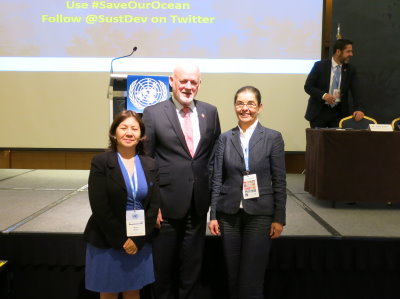 Cornelia E Nauen of Mundus maris reported on the long road towards the establishment of the small-scale fisheries academy in Senegal and early experiences with setting up its programme as a contribution towards implementing the small-scale fisheries (SSF) Guidelines as part of Agenda 2030.
Cornelia E Nauen of Mundus maris reported on the long road towards the establishment of the small-scale fisheries academy in Senegal and early experiences with setting up its programme as a contribution towards implementing the small-scale fisheries (SSF) Guidelines as part of Agenda 2030.
She underlined the importance of women in different segments of the fisheries value chains, for maritime cultures and conservation efforts and the urgency of phasing out bad subsidies, part of the agreed SDG 14. Most of these subsidies go into keeping otherwise unprofitable industrial vessels in business. In turn, labour-intensive SSF which are important for local economies, food security and eradicating poverty get little or no support from governments in the form of catch quotas, access to credit and social services to improve living conditions. That has to change so that people on the ground can experience the benefits of implementing the SDGs and partake actively in the process. The SSF Academy should contribute to this process. The slides can be seen here.
Connecting the global consensus around Sustainable Development Goal 14, SDG 5 (gender equity and equality) and other related SDGs to such efforts on the ground is essential to engage more and more citizens and organisations, including private companies, in the efforts towards implementation. This way they can experience for themselves that the aspirational declarations are directly relevant to their own lives and to the lives of their communities.
Almost 100 participants from different constituencies had joined from all continents. Many presented the challenges they were taking on and the results they had already achieved.
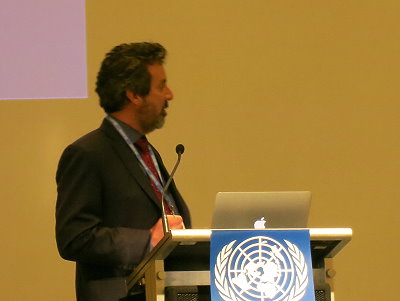 Julian Barbière of UNESCO laid out the process by which the UN Decade of Ocean Research for Sustainable Development 2021 to 2030 is being prepared and how the many stakeholders help shape its agenda.
Julian Barbière of UNESCO laid out the process by which the UN Decade of Ocean Research for Sustainable Development 2021 to 2030 is being prepared and how the many stakeholders help shape its agenda.
A big challenge is to align funding more strongly towards providing the scientific knowledges needed to achieve SDG 14 and underpin the many connections to other SDGs.
Stimulating further voluntary commitments (VC) by stakeholders towards global and regionally set goals is a priority. Many hopes are pinned to large collaborative projects and programmes which are transformative and can serve several societal outcomes.
At the forthcoming UN Ocean Conference in Lisbon, the results of ongoing global consultations, regional and thematic workshops and planning will be presented so as to get a head start for implementing the Decade.
In addition to the many institutional and technical presentations and discussions, an informal interactive session offered participants the chance to interact more in-depth with those projects and initiatives that provided additional materials and explanations in the format of a VC Café.
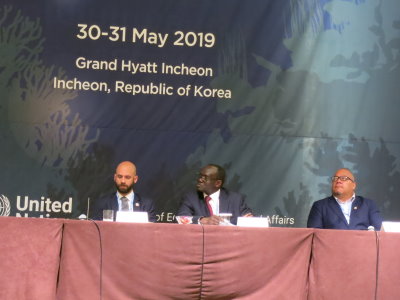 These opportunities were used by more than 15 organisations and initiatives. Cornelia Nauen was happy about the opportunity for rubbing shoulders with those interested in the work of Mundus maris."The echo on our innovative work with women and men in small-scale fisheries is encouraging and a strong motivation to keep going and seek further collaboration for higher impact." Cooperation will be key at all levels together with a strong sense of purpose and alignment of efforts.
These opportunities were used by more than 15 organisations and initiatives. Cornelia Nauen was happy about the opportunity for rubbing shoulders with those interested in the work of Mundus maris."The echo on our innovative work with women and men in small-scale fisheries is encouraging and a strong motivation to keep going and seek further collaboration for higher impact." Cooperation will be key at all levels together with a strong sense of purpose and alignment of efforts.
Peter Thomson had left no doubt from the beginning that the five big challenges to the ocean and its biodiversity are critical to the survival of humanity. He warned that overfishing driven by annual subsidies in the order of US$20 billion and IUU fishing worth another US$23 billion and marine pollution together with climate change related acidification, lowering oxygen levels and ocean warming represented extraordinarily grave threats. But he also kept insisting on his belief that human ingenuity and cooperation was a source of HOPE that runaway climate change could be averted.
Making big strides towards this goal must galvanise all actions now and in the future.
More information can be found on the new UN Oceans Conference website - background papers are here.
